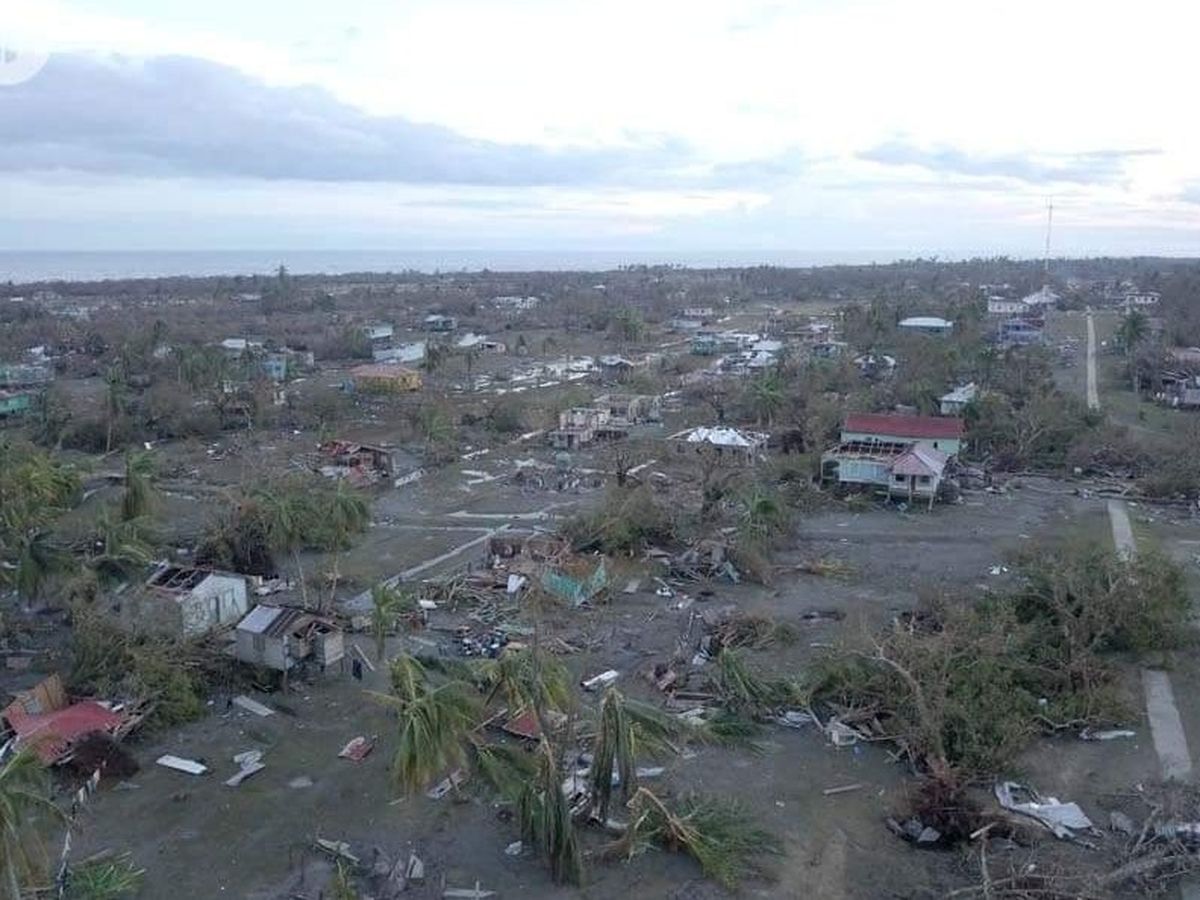On Tuesday, November 3, the Afro-Indigenous region of Moskitia on the Caribbean Coast of Central America was struck by the second most intense November hurricane on record. Category 4 Hurricane Eta lingered along the most densely inhabited coastal areas for over 10 hours before making landfall near the Miskitu village of Wawa Bar (pictured above). Eta flattened coastal villages that were already in the throes of a COVID-19 outbreak. The villages that were lucky enough to evacuate in the nick of time risked exposure and are likely to experience a spike in COVID-19 cases – a terrifying confluence of disasters that is sure to hinder reconstruction efforts over the coming months.
I have been visiting the Moskitia and learning the Miskitu language since 2014. The Moskitia is not an average region. It is a vibrant Afro-Indigenous region stretching along the Caribbean coast of Central America (Nicaragua/Honduras), inhabited by over 300,000 native speakers of the indigenous Miskitu language. The Spanish Empire never succeeded in colonizing or evangelizing the Moskitia despite multiple attempts, and the region has remained remarkably autonomous from the various empires, nation-states, transnational companies, and foreign settlers that continually seek to capitalize from their short-lived presence in the region.
On Wednesday morning, just as election results in the US began to shift, pointing towards a Trump defeat, I awoke to a barrage of texts and voice messages from friends and colleagues in the Moskitia: “Wawa Bar doesn’t exist anymore.” “Haulover is just a memory.” “My kids and I are ok but we lost everything.” Wooden houses built by mothers and grandfathers and great-grandparents had all been flattened; domestic animals like chickens, pigs, and sheep had all been swallowed by the sea.
While no amount of philanthropy will ever undo the legacies of colonialism, extractivism, and man-made global warming, the need for immediate economic and material support in the Moskitia is dire, to say the least. I am asking you to please support this very special region and these very special indigenous villages with whatever amount of money you might be able to contribute. The distribution of this assistance will be organized by my Miskitu friends and colleagues. Some of them are anthropologists and sociologists from rural Miskitu villages, others are fisherwomen and men working for transnational lobster and sea cucumber companies, and others are international migrants working as domestic workers and security guards in Panama and Costa Rica. My Miskitu friends will be documenting the labor of reconstruction, and I will continue updating this page with their photographs, videos, and words.
The Miskitu journalist Gilberto Artola has been documenting the impact of Hurricane Eta on Twitter: https://twitter.com/gilbertoartola
Please share this with friends and anyone else who might be interested in contributing. My Miskitu friends and I will greatly appreciate any help you might provide.
****** NOTE: If you are having trouble depositing contributions via the GoFundMe donations system, please follow this link to our parallel fundraising campaign on PayPal: ********




Thank you for your help!
I have been visiting the Moskitia and learning the Miskitu language since 2014. The Moskitia is not an average region. It is a vibrant Afro-Indigenous region stretching along the Caribbean coast of Central America (Nicaragua/Honduras), inhabited by over 300,000 native speakers of the indigenous Miskitu language. The Spanish Empire never succeeded in colonizing or evangelizing the Moskitia despite multiple attempts, and the region has remained remarkably autonomous from the various empires, nation-states, transnational companies, and foreign settlers that continually seek to capitalize from their short-lived presence in the region.
On Wednesday morning, just as election results in the US began to shift, pointing towards a Trump defeat, I awoke to a barrage of texts and voice messages from friends and colleagues in the Moskitia: “Wawa Bar doesn’t exist anymore.” “Haulover is just a memory.” “My kids and I are ok but we lost everything.” Wooden houses built by mothers and grandfathers and great-grandparents had all been flattened; domestic animals like chickens, pigs, and sheep had all been swallowed by the sea.
While no amount of philanthropy will ever undo the legacies of colonialism, extractivism, and man-made global warming, the need for immediate economic and material support in the Moskitia is dire, to say the least. I am asking you to please support this very special region and these very special indigenous villages with whatever amount of money you might be able to contribute. The distribution of this assistance will be organized by my Miskitu friends and colleagues. Some of them are anthropologists and sociologists from rural Miskitu villages, others are fisherwomen and men working for transnational lobster and sea cucumber companies, and others are international migrants working as domestic workers and security guards in Panama and Costa Rica. My Miskitu friends will be documenting the labor of reconstruction, and I will continue updating this page with their photographs, videos, and words.
The Miskitu journalist Gilberto Artola has been documenting the impact of Hurricane Eta on Twitter: https://twitter.com/gilbertoartola
Please share this with friends and anyone else who might be interested in contributing. My Miskitu friends and I will greatly appreciate any help you might provide.
****** NOTE: If you are having trouble depositing contributions via the GoFundMe donations system, please follow this link to our parallel fundraising campaign on PayPal: ********




Thank you for your help!


